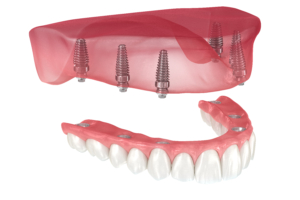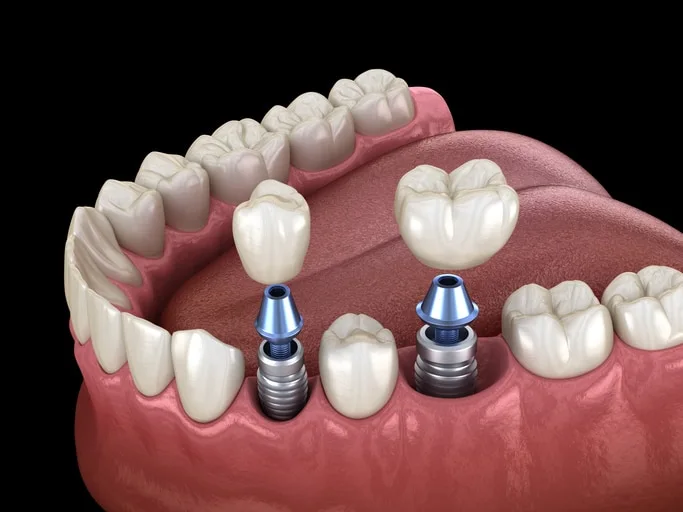Believe it, there is a relationship between dental implants and bone health in your mouth! When your orthodontist or dentist completes a dental implant placement procedure, the success of your new teeth and overall oral health depends on a healthy jawbone.
If you have dental implants or are planning to visit the dental clinic to get your new teeth, you definitely want to read on to understand how dental implants and bone health have a beneficial relationship.

Understanding this link is important for dental care, the successful healing of your implants, and bone health. Important subjects to explore in this reading include the significance of dental bone health, why dental implants, the link between dental implants and bone health, and maintaining bone health after a dental implant placement procedure. Let’s get into it!
The Significance of Dental Bone Health
Bone health is crucial because bones support your body while ensuring a symmetrical physical appearance. In dental health, the jawbone’s role is to hold your teeth in place, which in turn maintains symmetrical facial features.
You may lose your teeth due to gum disease, decay, or trauma. Missing teeth affects the health of your jawbone. You may have heard your orthodontist use the term resorption, referring to an unhealthy shrinking jawbone.
Poor dental bone health leads to trouble chewing food, speaking, and facial structure issues.
Why Dental Implants?
Dentures and bridges won’t solve the problem of bone loss in missing teeth. Thus, they do not support bone health.
The best and most permanent solution is the placement of dental implants. Unlike dentures and bridges that are supported by gums and neighboring teeth, implants are placed into the jawbone, dealing with the issue of bone loss directly because they solidify and fuse with the jawbone.
Dental implants facilitate dental care. They stimulate the surrounding bone tissue since they imitate the structure of the natural tooth root, promoting new and strengthened bone growth and adding to its volume. The continuous stimulation ensures continued jawbone health giving the new and natural teeth stability and support.
The Interdependent Relationship
The link between dental implants and bone health is said to be interdependent. This means that one element is valuable to the other. The dental implant depends on the jawbone’s health for stability and support of the artificial teeth. Conversely, the bone depends on the implant for health through stimulation and protection. The success of implant placements and dental health depends on this symbiotic relationship.
Once the dental implant is placed into the jawbone, the fusion process, which dentists commonly call osseointegration, begins immediately. The implant forms a solid and long-lasting connection with the bone over time, promoting healing and the functionality of the new teeth, which are similar to natural teeth.
A successful dental implant means effective osseointegration that facilitates normal dental functions including, a strong jawbone, regular dental care, and overall oral healthcare.
Maintaining Bone Health Following Dental Implants
You should maintain bone health and the success of dental implants in the long-term by implementing preventative measures.
Start by maintaining jawbone health by ensuring timely teeth replacement. Whether it is one, two, or several missing teeth, swift replacement is crucial to reducing the risk of dental bone loss. A permanent solution that your orthodontist will most likely suggest is dental implant placement. The implants enable bone health by facilitating the maintenance of bone structure, chewing, and preventing bone resorption.
Maintaining thorough oral hygiene and dental care before and after dental implants is essential. Effective dental care entails regular brushing flossing, and dental check-ups. These are oral care practices that prevent gum disease and damage on the implants and the healing jawbone
Always ensure regular professional monitoring of your implants, as instructed by your dentist. These regular dental check-ups assess the implants’ functionality, the jawbone’s health, and your teeth’ health. Cutting-edge technology ensures early detection of possible issues to your implant or jawbone.
You will also have to make some healthy lifestyle changes! Bone health and the success of your new implants require you to quit or abstain from actions that might affect successful fusion and healing, such as smoking, excessive alcohol consumption, using force while chewing, or engaging in activities that might cause injury to your teeth.
Ensure you get adequate calcium and vitamin D after implant placement to promote bone development.
Now you are knowledgeable! Dental plants and bone health have a mutually beneficial link! Your orthodontist or dentist will place dental implants directly into the healthy jawbone that holds them in place. The implants in turn enable the jawbone to continue growing and maintaining its functionality.
A continued successful connection between the two depends on several factors including dental care, oral care, treatment of oral infections, regular visits to your dentist, and well-being. There you have it! Dental implants will restore your teeth, confidence, and face beauty, alongside a strong jawbone. Where dental implants are suggested, do not hesitate to restore your smile and bone health!
Recommended post: Is dental implant for single tooth replacement good for you?

